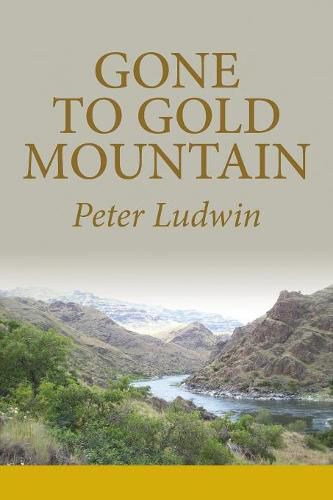Readings Newsletter
Become a Readings Member to make your shopping experience even easier.
Sign in or sign up for free!
You’re not far away from qualifying for FREE standard shipping within Australia
You’ve qualified for FREE standard shipping within Australia
The cart is loading…






This title is printed to order. This book may have been self-published. If so, we cannot guarantee the quality of the content. In the main most books will have gone through the editing process however some may not. We therefore suggest that you be aware of this before ordering this book. If in doubt check either the author or publisher’s details as we are unable to accept any returns unless they are faulty. Please contact us if you have any questions.
In Gone to Gold Mountain, poet Peter Ludwin brings to life the little-known story of Chea Po and his fellow Chinese gold miners, massacred in 1887 by Eastern Oregon pioneers. Ludwin embodies Chea Po and his experiences of breathtaking racism, homesickness, and dislocation. He imbues these persona poems, letters, and laments with the finely-drawn landscapes of Hells Canyon and China, glowing lanterns, and an eagle circling the canyon rim. Chea Po seems to have haunted Ludwin until finally, here, his life and death are told justly. We are the richer for it. –Kathleen Flenniken
Peter Ludwin is a writer who knows there are poems no one asks for, but everyone needs–so he sets out to write them. In this book, he travels to a place of massacre, then enhances the story of trauma with longing, devotion, hope, and the unfurling tendril of life that reaches generations beyond a tragedy. The poems speak as letters, news items, memories, secret notes of lover to lost soul. Ludwin’s lens of imagination pierces a hidden past at a remote place, and his lyric archive invents what might otherwise be forgotten, what he calls ‘the speckled rhythms’ of change. Read this book for insight into a hidden chapter of international history, and to break a code of silence across cultures. You will recognize more poems need rich research, and history needs to sing. –Kim Stafford author of Early Morning: Remembering My Father, William Stafford, 100 Tricks Every Boy Can Do: A Memoir, and Muses Among Us: Eloquent Listening and Other Pleasures of the Writer’s Craft
Ludwin’s haunting poems resurrect an era of vehement anti-Chinese sentiment and the U.S. by focusing on the Hells Canyon massacre in 1887–a segment of U.S. history conveniently omitted from the textbooks. To a great extent, the work’s strength lies in its understated eloquence, riveting imagery, and frequent use of persona poems in different voices. With great insight, skill and compassion, Ludwin has produced a fine collection that succeeds in fleshing out this nightmare episode from our past. –Diana Anhalt, author of because there is no return.
$9.00 standard shipping within Australia
FREE standard shipping within Australia for orders over $100.00
Express & International shipping calculated at checkout
This title is printed to order. This book may have been self-published. If so, we cannot guarantee the quality of the content. In the main most books will have gone through the editing process however some may not. We therefore suggest that you be aware of this before ordering this book. If in doubt check either the author or publisher’s details as we are unable to accept any returns unless they are faulty. Please contact us if you have any questions.
In Gone to Gold Mountain, poet Peter Ludwin brings to life the little-known story of Chea Po and his fellow Chinese gold miners, massacred in 1887 by Eastern Oregon pioneers. Ludwin embodies Chea Po and his experiences of breathtaking racism, homesickness, and dislocation. He imbues these persona poems, letters, and laments with the finely-drawn landscapes of Hells Canyon and China, glowing lanterns, and an eagle circling the canyon rim. Chea Po seems to have haunted Ludwin until finally, here, his life and death are told justly. We are the richer for it. –Kathleen Flenniken
Peter Ludwin is a writer who knows there are poems no one asks for, but everyone needs–so he sets out to write them. In this book, he travels to a place of massacre, then enhances the story of trauma with longing, devotion, hope, and the unfurling tendril of life that reaches generations beyond a tragedy. The poems speak as letters, news items, memories, secret notes of lover to lost soul. Ludwin’s lens of imagination pierces a hidden past at a remote place, and his lyric archive invents what might otherwise be forgotten, what he calls ‘the speckled rhythms’ of change. Read this book for insight into a hidden chapter of international history, and to break a code of silence across cultures. You will recognize more poems need rich research, and history needs to sing. –Kim Stafford author of Early Morning: Remembering My Father, William Stafford, 100 Tricks Every Boy Can Do: A Memoir, and Muses Among Us: Eloquent Listening and Other Pleasures of the Writer’s Craft
Ludwin’s haunting poems resurrect an era of vehement anti-Chinese sentiment and the U.S. by focusing on the Hells Canyon massacre in 1887–a segment of U.S. history conveniently omitted from the textbooks. To a great extent, the work’s strength lies in its understated eloquence, riveting imagery, and frequent use of persona poems in different voices. With great insight, skill and compassion, Ludwin has produced a fine collection that succeeds in fleshing out this nightmare episode from our past. –Diana Anhalt, author of because there is no return.